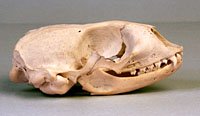|
The commonest seal in the arctic, usually associated with fast ice rather than pack. The teeth are adapted for gripping fish, with little differentiation between molars and premolars. The skull has the very large eyes typical of many seals and is so fragile as to be translucent, which means that complete skulls are rare, usually being damaged by wave action and reduced to a roughly spherical brain-case with heavy ear bones attached. The fragility of the skull does, however, mean that clubbing is a perfectly rational method for killing them; I have seen an Inuit kill a young ringed seal with a blow of his fist.
|

1. Ringed Seal skull
Click for larger image
|
|
Internet Resources
BU :
MS :
UM (explained)
|
|
Taxonomy:
Order - Carnivora (typical carnivores)
Suborder - Caniformia (dog-like)
Family - Phocidae (seals)
Scientific Name:
Pusa - from the Greenlandic name
hispida "bristly"
Dental Formula
U 3.1.5 - L 2.1.5
Measurements: (explained)
Condylobasal length - 190mm
Zygomatic width - 105mm
Jaw length - 112mm
Collection Data
Stage - Adult
Area collected - N. E. Greenland
Date collected - August 1992
Collection ref. - 92.013
Source - Found on beach
|